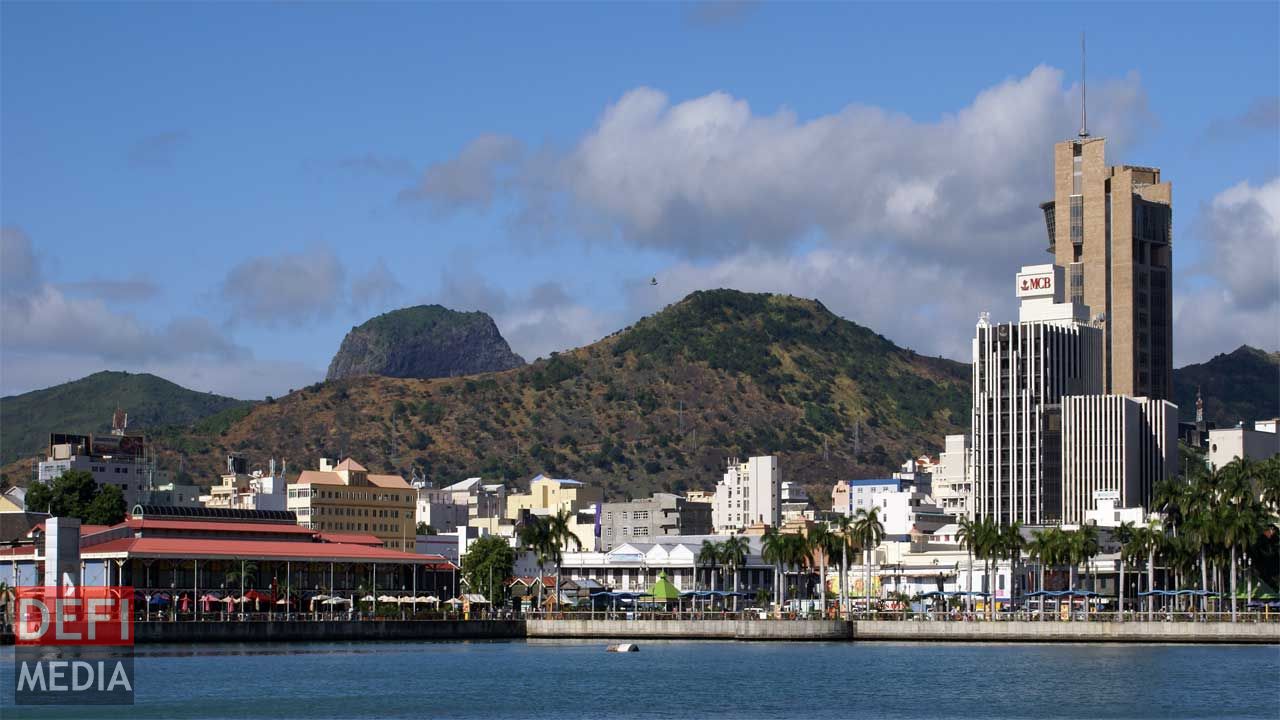
Un an après l’introduction du salaire minimum national, 57% des sondés estiment limité son effet sur la consommation en général.
Publicité
1. Pour vous, 2018 a été pour l’économie mauricienne une année...
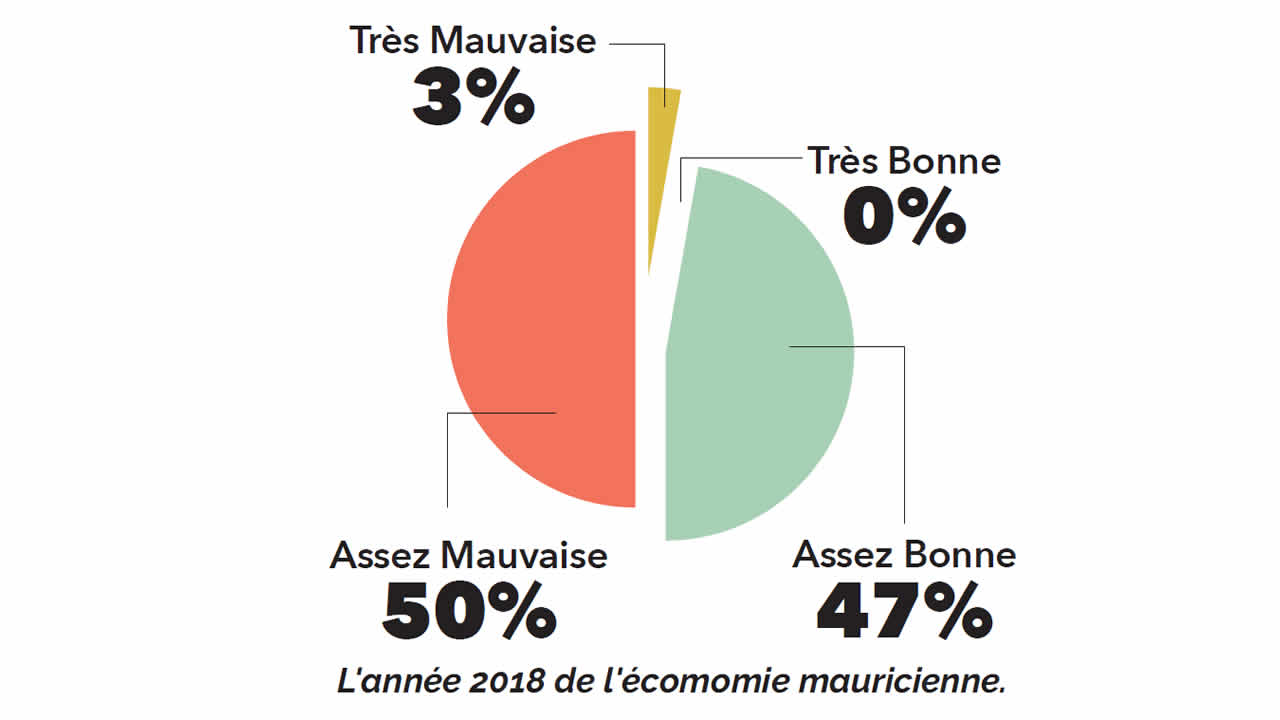
Une année moins mauvaise
Pour 53% des sondés, notre économie aura connu une année 2018 plutôt mauvaise, mais le taux d’opinion défavorable était de 57% en 2017, de 70% en 2016 et de 80% en 2015. Selon un économiste, « the economy performed relatively well with growth remaining fairly resilient, inflation under control and declining unemployment. However, the economy would have achieved a better performance had appropriate reform measures been implemented in a prompt manner. » Concrètement, « we had budgets with a complete absence of vision and innovative ideas. When an economy cannot attract investments but suffer a deteriorating trade balance, it has run out of steam. In addition, the Global Business sector is put at risk, and decisions about our cane industry are delayed. »
2. Selon vous, les événements politiques durant l’année 2018 ont eu sur l’économie mauricienne un impact négatif...
| Considérable | 13% |
| Assez grand | 40% |
| Petit / Négligeable | 47% |
La politique moins prégnante
Notre économie a été peu affectée par les problèmes politiques cette année, selon 47% des répondants (33% en 2017). Pour eux, « the political circus does not disrupt the private sector » et « people are used to these shenanigans now ». Cependant, « the image of destruction-bashing of business still remains » et « whilst the direct impact of scandals and controversies on the political front may not be sizeable at first glance, it becomes considerable when the opportunity cost of a lack of proper economic policies is factored in ». Du moins, « such occurrences have certainly put into light governance issues within our institutions, which will undermine the business environment if there is no change in mindset ». Ainsi, « the lack of political leadership is the real problem ».
3. L’indicateur économique qui a suscité le plus d’inquiétudes chez vous pendant l’année 2018 est....
| La croissance | 23% |
| Le chômage | 0% |
| L’inflation | 0% |
| Le déficit commercial | 23% |
| La dette publique | 53% |
La dette publique inquiète toujours
Tout comme l'année dernière, la dette publique est l'indicateur économique qui inquiète le plus, en l'occurrence chez 53% des analystes. Car « we are living beyond our means ». Tous ces indicateurs sont liés : « If there is no economic growth, unemployment will rise, the balance of trade will deteriorate and public debt is bound to increase. » Il s'avère que « further analysis of the economic indicators highlight underlying imbalances or weaknesses related to the youth and female unemployment as well as to exports of goods ». Ainsi, « the declining trend in exports is a serious source of concern, considering that improving export performance is deemed to be the most creditable manner in which a small island economy could achieve appreciable and sustained growth ».
4. Selon vous, le salaire minimum a eu sur la consommation en général un effet positif…
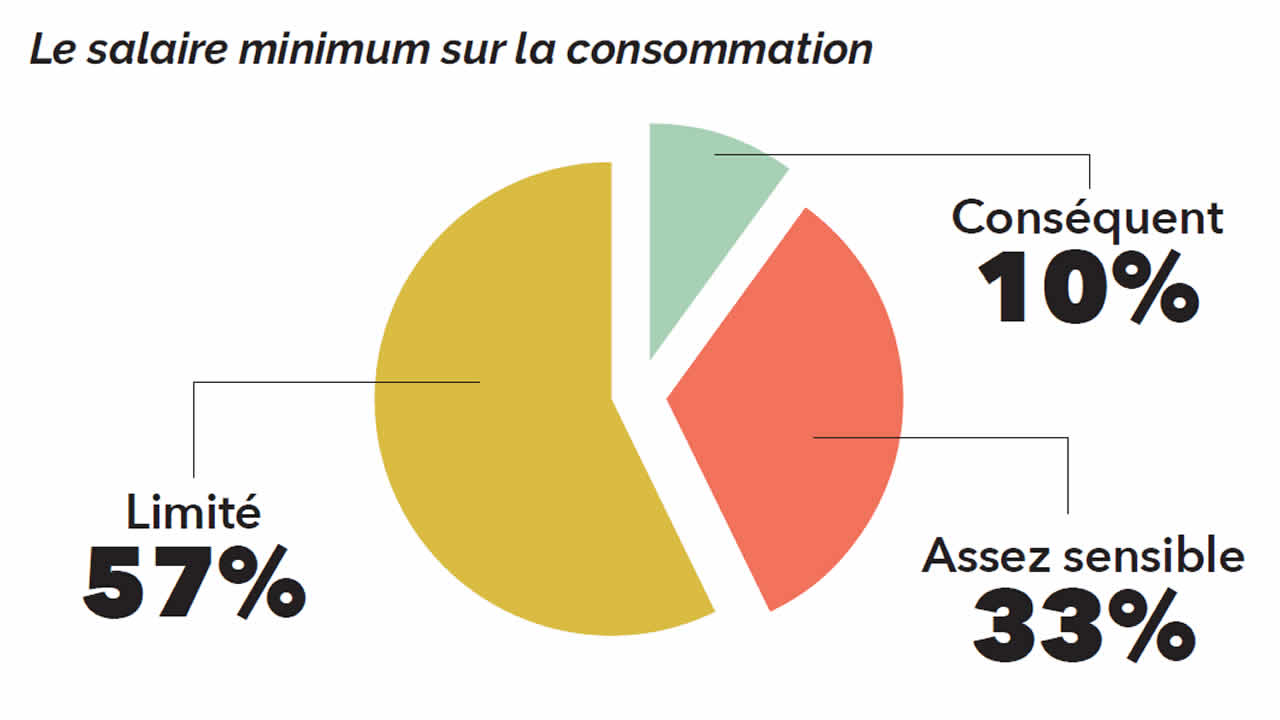
Effet limité du salaire minimum
La majorité des sondés pensent que l’impact du salaire minimum sur la consommation est limité. Pour les uns, « it was a great social move » permettant plus de dépenses de consommation. Pour les autres, « the effect does not look material. Any gain on consumption is partly offset by decreasing competitiveness and by an increase in business cost. » D’ailleurs, « businesses are going out of manufacturing and shifting to trading ». Au niveau national, « the drastic fall in the quantum of savings is an indication that the population’s disposable income has been eroded as householders usually save for future spending ».
5. Êtes-vous satisfait de la politique économique du gouvernement menée au cours de l’année 2018 ?
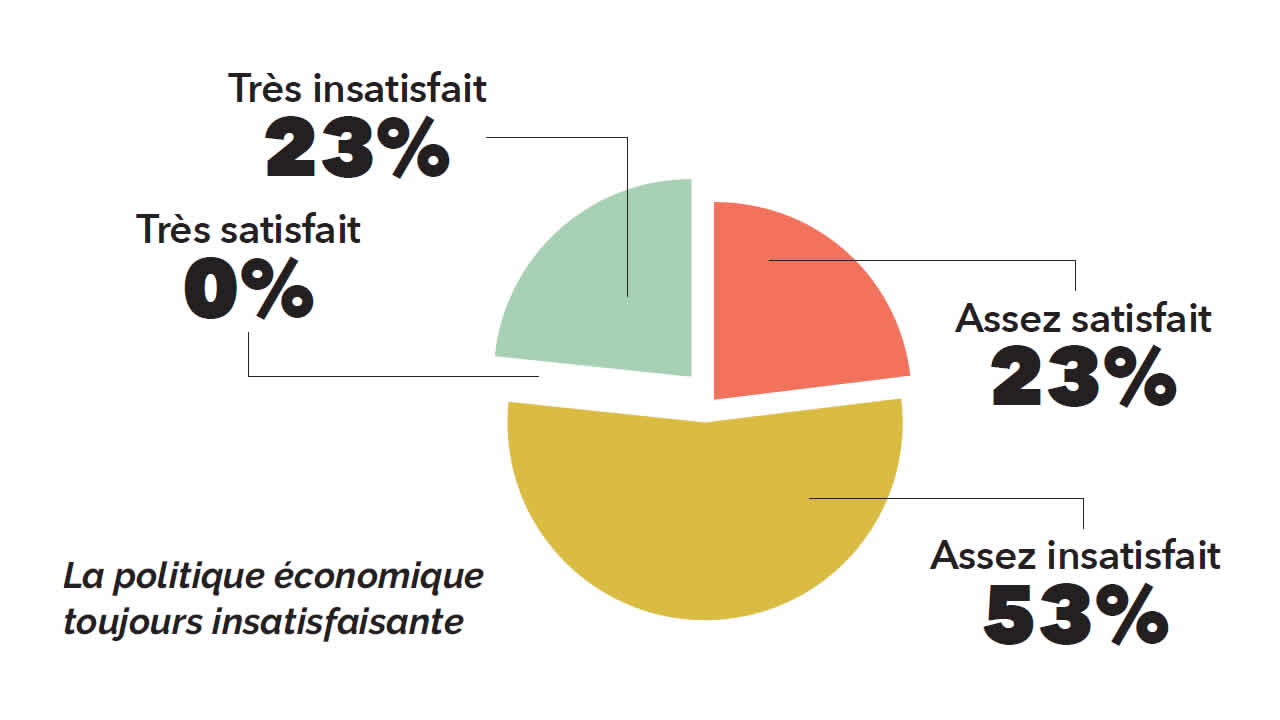
La politique économique toujours insatisfaisante
La politique économique du gouvernement ne satisfait toujours pas nos analystes avec 77% d’insatisfaits, après 83% en 2017, 90% en 2016 et 87% en 2015. Selon un économiste, « notwithstanding the implementation of large scale infrastructure projects and measures to provide relief to people at the low end of the income ladder, some policies defy economic rationale while key issues seem unaddressed. Our fiscal regime is becoming increasingly fragmented, somewhat departing from the simple framework which has hitherto served us well, while there does not seem to be any commitment to tackle the implications of the ageing population. » De plus, « no significant measures were taken in light of the challenges faced by the financial services sector ».
6. Comment avez-vous vu la politique monétaire menée en 2018 ?
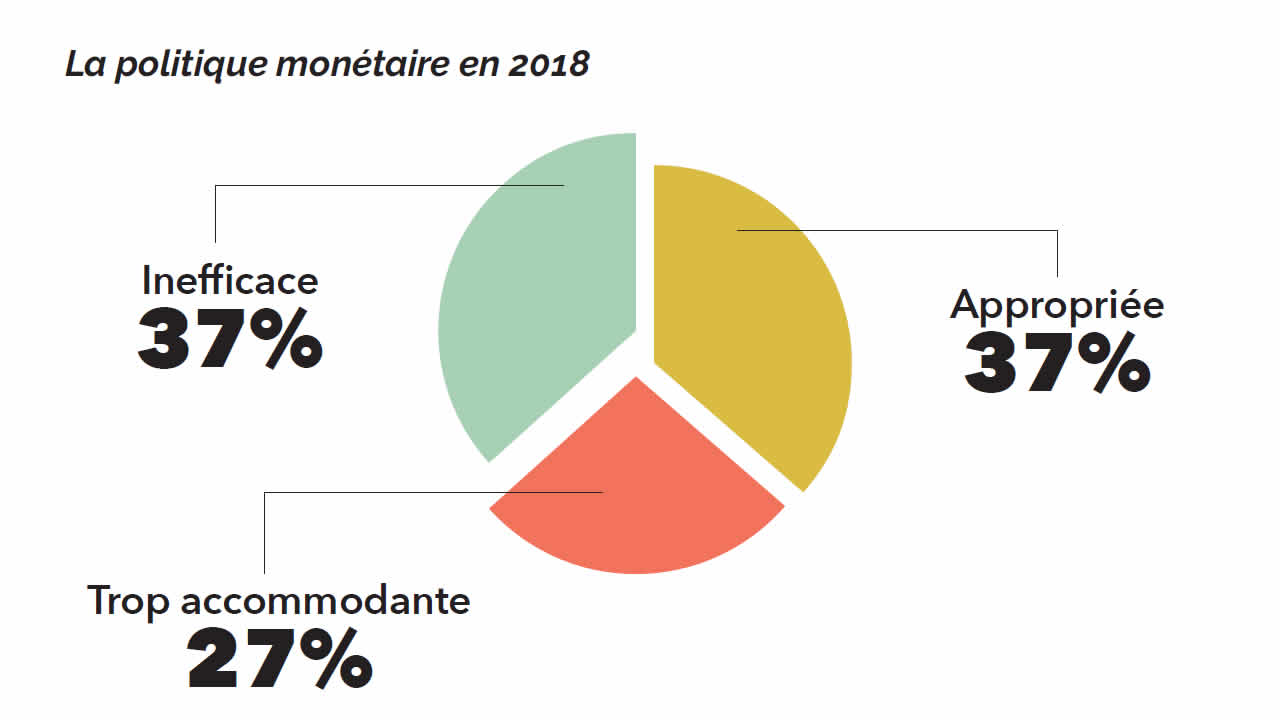
La politique monétaire divise
Si 37% des sondés estiment appropriée la politique monétaire suivie en 2018, il y a autant d’analystes qui la trouvent inefficace. Pour les premiers, « since monetary policy must support and be consistent with fiscal policy to achieve economic growth, in the absence of new ideas from the Treasury, the central bank has no other choice but to remain on the fence ». Pour les seconds, « there are no clear signals », et surtout « no framework. We do not know if they do exchange rate targeting, inflation targeting or nominal GDP targeting. Nothing is quantified. » De là, « there is a tendency to stay within status quo. Doubts can be raised about the Bank of Mauritius’ firepower to steer through any financial crisis occurring in the near future. »
7. Comment avez-vous trouvé le secteur privé en 2018 ?
| Dynamique (fonceur) | 3% |
| Tiède (sans ferveur) | 67% |
| Passif (attentisme) | 30% |
Un secteur privé plus passif
Les analystes sont quasi-unanimes à dire que le secteur privé n’a pas été dynamique en 2018. L’attentisme s’est accru par rapport à l’année dernière. Alors que « the financial services have witnessed some fairly large transactions », on déplore que « there is only one sector which is attracting investment: the real estate ». En effet, « in the absence of any innovative ideas, the private sector is building integrated resort complexes. They are becoming rent earners rather than income generators. The so-called industry captains need to wake up and start investing in new technologies before it is too late. » Malheureusement, « the private sector is not investing ».
8. Quelle note donnez-vous au bilan économique des quatre ans du gouvernement actuel ?
| AU-DESSUS de la moyenne | 0% |
| La moyenne | 33% |
| EN-DESSOUS de la moyenne | 67% |
Le bilan économique en-dessous de la moyenne
Deux tiers des sondés donnent une note en-dessous de la moyenne au bilan économique du gouvernement. Pendant quatre ans, « the economy has been stagnating ». « To put it bluntly, the ruling alliance did not expect to be elected, hence a government made up of members with no experience or qualification, let alone any interest in making overdue reforms. More efforts and resources were put in place to engineer the primeministership of Pravind Jugnauth than to actually implement measures promised during the electoral campaign. » Pour diriger le pays, il faut « a more proactive leadership ».
Enquête réalisée par PluriConseil du 3 au 6 décembre 2018 auprès d’un échantillon représentatif de 30 analystes économiques et financiers.

Notre service WhatsApp. Vous êtes témoins d`un événement d`actualité ou d`une scène insolite? Envoyez-nous vos photos ou vidéos sur le 5 259 82 00 !



















